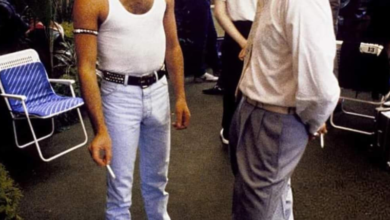Is Harrison Ford Really Struggling with Mental Health? The Actor Sets the Record Straight
OPINION: This article may contain commentary which reflects the author's opinion.
Harrison Ford is known for his iconic roles in films like Indiana Jones, Star Wars, and The Fugitive. His enduring career has spanned decades, but recently, the actor has found himself at the center of a discussion about mental health. With the portrayal of a therapist diagnosed with Parkinson’s disease in the Apple TV+ series Shrinking, speculation about Ford’s own mental health has been rampant. However, the actor himself is setting the record straight and offering clarity on his views and personal experiences with mental health.
Portrayal of Mental Health in “Shrinking”
In Shrinking, Ford plays Dr. Paul Rhodes, a seasoned therapist who is coping with Parkinson’s disease. Parkinson’s is primarily a neurological disorder, but it can lead to serious mental health challenges, including depression and anxiety. Ford’s role has garnered praise for its sensitive and authentic portrayal of a man struggling not only with his physical health but also with the psychological impact of his condition.
Ford, known for his dedication to his craft, has expressed his commitment to representing his character’s mental health journey with deep sincerity. In interviews, he has emphasized that he takes his role “deadly f—ing seriously,” aiming to depict his character’s experience with “grace, courage, and wisdom.” His performance in Shrinking is a powerful example of how actors can bring awareness to mental health issues while showing empathy and understanding.
Addressing Misconceptions About His Own Mental Health
Despite the complex nature of his character in Shrinking, Ford has made it clear that he is not struggling with mental health issues like social anxiety disorder, a condition often speculated about due to his reserved nature in public settings. Ford has attributed his seemingly distant demeanor in interviews to his dislike of uninteresting situations, rather than any personal struggle. He directly addressed the issue by stating, “I don’t have a social anxiety disorder. I have an abhorrence of boring situations.”
Ford’s candid response serves to separate the actor from the roles he plays. While his characters often deal with psychological complexities, Ford himself is clear about his own emotional well-being, further debunking rumors about his mental health.
Personal Views on Therapy
When it comes to therapy, Ford has shared his stance on the subject, explaining that while he is supportive of therapy for others, he personally does not feel it is necessary. In a refreshingly blunt manner, Ford remarked, “I’m not anti-therapy for anybody except for myself… I know who the f— I am at this point.” His statement reflects a deep sense of self-awareness and confidence in his ability to navigate life without external help.
While Ford’s personal view may not align with the widespread advocacy for therapy, his openness about his position contributes to the broader discussion on mental health, highlighting the importance of self-understanding and individual approaches to emotional well-being.
Selection of Roles Reflecting Mental Health Themes
Throughout his illustrious career, Ford has consistently chosen roles that explore complex psychological themes. In The Mosquito Coast, Ford portrays an inventor whose obsessive idealism endangers his family, delving into the realms of obsession and mental instability. In What Lies Beneath, he plays a husband dealing with guilt and secrecy, revealing the psychological turmoil beneath the surface of his seemingly perfect life.
These roles reflect Ford’s willingness to confront characters who grapple with mental health issues, demonstrating his awareness of the importance of representing psychological struggles in cinema. By choosing such roles, Ford continues to contribute to conversations about mental health and its representation in media.
Advocacy and Awareness
By portraying characters who deal with mental health issues and speaking about the topic in interviews, Ford plays a role in advocating for mental health awareness. His performances not only raise awareness about the struggles faced by individuals dealing with psychological challenges but also serve to destigmatize these issues. Ford’s involvement in such meaningful projects encourages a more open dialogue about mental health, showing that it is something that can be addressed with empathy, understanding, and grace.
In conclusion, while Harrison Ford may not be personally struggling with mental health issues, his work both on-screen and off-screen has had a significant impact on the conversation about mental health. By taking on roles that challenge societal views on mental well-being and speaking candidly about his own experiences, Ford has proven to be more than just a Hollywood icon—he is an advocate for the importance of addressing mental health with compassion and honesty.



